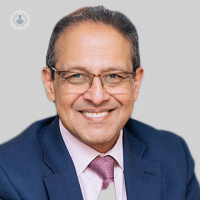Oesophageal manometry: How to check problems of the oesophagus
Written by:Oesophageal manometry is a test that measures how well the muscles and nerves work in the oesophagus, which is the tube that takes food from the back of the mouth to the stomach. It’s here that the muscles contract to push food downwards. The test determines if the muscles are squeezing food and drink correctly.
We’ve asked one of our top consultant general surgeons, Professor Muntzer Mughal, to explain what happens during the test, how it works, and when results will be received.

What is an oesophageal manometry?
Oesophageal manometry is a test to assess peristalsis in your gullet. Peristalsis is the way the muscle of your gullet contracts to push food forward when you eat. It also measures the pressure in the sphincter muscle between your gullet and the stomach.
Who would have one?
It is performed to diagnose conditions such as achalasia and often before considering surgery for acid reflux, and certainly before a reoperation.
How does an oesophageal manometry work?
The modern equipment is called high-resolution manometry. A tube fitted with tiny solid stage pressure sensors (transducers) is placed in the gullet. You are asked to swallow small amounts of water and with each swallow, signals from the transducers are analysed to produce a trace displaying the strength and progression of the peristaltic wave.
Can I eat or drink before the test?
In most cases, you will be asked not to eat or drink anything between four and six hours before the test.
What happens during the test?
You will be asked to take 10 swallows of a small amount of water.
What happens with the results afterwards?
The tests will be analysed by a gastroenterologist with expertise in reporting on oesophageal manometry, and the results will be sent to your consultant with a report.
If you're having difficulty in swallowing your food and drink, do not hesitate to book an appointment with Professor Muntzer Mughal for an oesophageal manometry.



